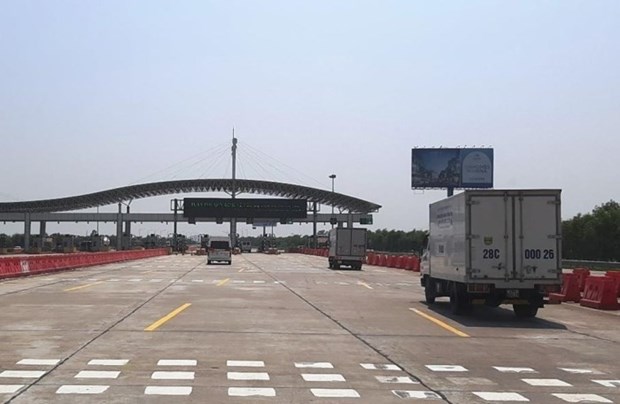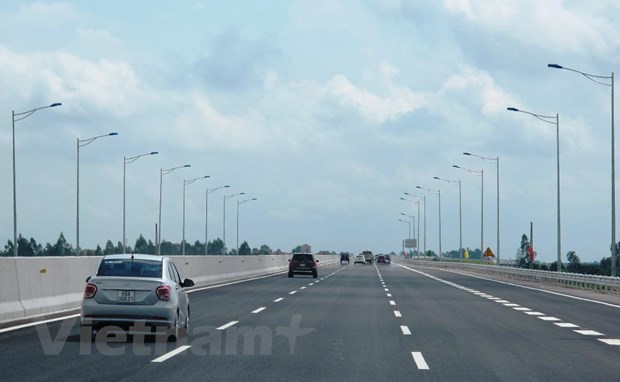HN–Hai Phong expressway: Debt burden, investment environment concerns
 The investor of the Hanoi – Hai Phong expressway is breaking its back to pay debts because the State has not been able to pay its committed capital. (Photo: VietnamPlus)
The investor of the Hanoi – Hai Phong expressway is breaking its back to pay debts because the State has not been able to pay its committed capital. (Photo: VietnamPlus)
Hanoi (VNA) - The State has yet to pay its committed capital to the investor of the Hanoi – Hai Phong expressway, putting it at risk of bankruptcy.
The Hanoi – Hai Phong project has been carried out for more than 10 years but the State’s commitments to pay capital for the investor (Vietnam Infrastructure Development and Financial Investment Corporation – VIDIFI) have yet to be implemented. This might lead to the project’s bankruptcy and difficulties to call for investment.
Who will pay the debt of 800 billion VND?
In 2007, as Highway 5 was heavily overloaded, the Prime Minister decided to construct the Hanoi-Hai Phong expressway. Due to State budget difficulties, the project was implemented under a pilot mechanism. The State capital in the project was to be gradually paid from the budget and to be collected from land use and land rent fees from urban areas established after the road’s construction.
Specifically, State compensation for land clearance was 4.069 trillion VND (177.3 million USD). VIDIFI borrowed the sum from the Vietnam Development Bank (VDB) and transferred it to localities to implement land clearance from 2008 to 2010. Because it was impossible to allocate the capital immediately, the State committed to pay the compensation for land clearance in the medium-term public investment plan in 2016-2020.
The Government guaranteed foreign loans worth 300 million USD for VDB and VIDIFI to implement the project. The State agreed to gradually repay the principle loans of the aforesaid loans when the payment dates come (from 13 to 30 years) and part of the State capital was to be collected from land use and land rent fees from urban areas and industrial parks established after the road construction (around 5.2 trillion VND).
According to Nguyen Van Tinh, Director General of VIDIFI, the Hanoi – Hai Phong expressway has been carried out for more than 10 years but the State’s capital payment commitments for VIDIFI according to the Prime Minister’s Decision 746 have yet to be realised.
Therefore, VIDIFI still has to borrow from VDB with annual interest of 10 percent. As of 2018, the interest rates reached about 800 billion VND (34.6 million USD).
Tinh expressed his concerns that if the State’s aid packages were not quickly granted, VIDIFI would have the project’s financial plan broken and go bankrupt.
If the foreign loans were not paid as scheduled, it would affect the Government’s commitments to overseas capital sponsors and hurt the investment environment in Vietnam.
The loans were offered by six financial institutions and international banks, namely Keximbank, Kfw, Citi Bank Japan, Sumitomo Mitsui Banking, MUFG Bank and Sumitomo Trust & Banking.
When borrowing foreign capital, the project’s approved financial plan was sent to international financial institutions, including the payback period, the implementation roadmap, and the State support.
The organisations are very concerned about the feasibility of the financial plan and the ability to repay the loans as well as the implementation of the State aid packages for the project, Tinh said.
Concerns over prestige, investment environment
According to Tinh, VIDIFI has reported to the Prime Minister, ministries and departments on the implementation of the State aid packages. However, restrictions have yet to be removed despite clear guidelines from the Politburo, National Assembly and Prime Minister.
Specifically, the Prime Minister issued Document 334/TB-VPCP on August 3, 2018 directing ministries and departments to supplement the medium-term public investment plan of the Ministry of Transport for 2016-2020 and beyond to pay capital aid packages for the VIDIFI to invest according to the Prime Minister’s Decision 746/QD-TTg dated May 29, 2015, including land clearance and resettlement expenses (4.069 trillion VND) and pay the principle loans when the dates come.
In Document 209/BC-BCA-ANKT dated April 3, 2019, the Ministry of Public Security reported to the Government that despite the guidelines of the Politburo, National Assembly and Government, many support mechanisms for the project according to the Prime Minister’s Decision 746/QD-TTg have not been implemented, leading to difficulties in capital recovery and possibly ruining the project’s financial plans, particularly being unable to pay foreign loans guaranteed by the Government, affecting the Government’s commitments to overseas capital sponsors as well as the investment environment in Vietnam.
Given this situation, the Ministry of Public Security proposed the Government direct the Ministry of Finance to coordinate with relevant ministries and department to remove difficulties and bottlenecks relating to financial mechanisms and ensure the project’s investment efficiency.
At the seventh working session of the 14th National Assembly, the Government asked the National Assembly to allow the allocation of 4.1 trillion VND out of the 10 trillion VND, which was sourced from the reduction of capital resources of important projects, for the Hanoi–Hai Phong expressway.
However, after reviewing the Government’s reports, the NA Committee on Finance and Budget realised the allocation of more than 40 percent of the total debt payment for compensation, support, resettlement and land clearance of the Hanoi – Hai Phong expressway is unreasonable.
 Vehicles move on Hanoi-Hai Phong expressway (Photo: VietnamPlus)
Vehicles move on Hanoi-Hai Phong expressway (Photo: VietnamPlus)The VDB reported to the Politburo about the State’s commitments to the investor according to the Prime Minister’s Decision 746/QD-TTg. The Politburo assigned the National Assembly Party Organization and the Government’s Party Committee to allocate sufficient State budget-sourced sums which are committed by the Government and the Prime Minister in its document No 6726-CV/VPTW dated May 25, 2018, according to Tinh.
“If the project goes bankrupt, the VIDIFI will not be able to pay for banks, including the 570 million USD loan from six foreign banks. VIDIFI is a State-owned enterprise. If private firms do not have money for the maintenance and operation of the road, it will be closed,” he warned.
The allocation of capital to pay debts is the State’s responsibility, he said, adding that due to the limited budget, the State should balance the capital and pay in advance 2 trillion VND among the total amount of more that 4 trillion VND to solve difficulties for VIDIFI.
The State does not need to pay all but can pay gradually as committed, Tinh said.-VNA













